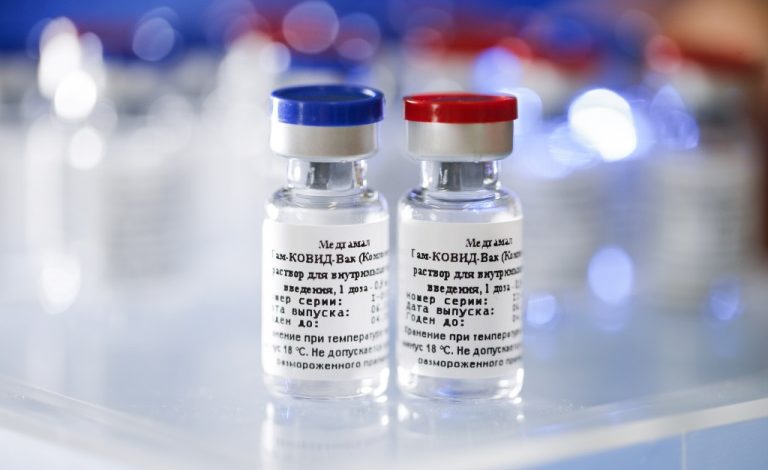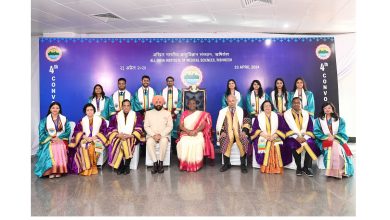Sputnik V vaccine’s efficacy confirmed at 91.4 per cent

This is based on data analysis of the final control point of clinical trials
The National Research Center for Epidemiology and Microbiology (Gamaleya Center) and the Russian Direct Investment Fund (RDIF), Russia’s sovereign wealth fund), announced 90 per cent efficacy of Russian Sputnik V vaccine. This was demonstrated by the final control point data analysis of the largest double-blind, randomised, placebo-controlled Phase III post-registration clinical trials of the Sputnik V vaccine against novel coronavirus infection.
Evaluation of efficacy was carried out among volunteers (n = 22 714) 21 days after receiving the first dose of the vaccine or placebo upon reaching the third and final statistically significant representative control point of the trial in compliance with the Phase III clinical trial protocol of the Sputnik V vaccine. The data analysis at the final control point of the trials demonstrated a 91.4 per cent efficacy rate.
The analysis of the Sputnik V vaccine efficacy at the final control point was carried out based on 78 confirmed cases identified in the placebo group (62 cases) and the vaccine group (16 cases). The ratio of the placebo group to the vaccinated group is 1 to 3.
The vaccine demonstrated 100 per cent efficacy against severe coronavirus cases. There were 20 severe cases of coronavirus infection among confirmed cases in the placebo group and no severe cases in the vaccine group.
According to the protocol of Phase III clinical trials of the Sputnik V vaccine, its interim efficacy is calculated at three statistically significant representative control points – upon reaching 20, 39 and 78 cases of novel coronavirus infection among volunteers both in the placebo group and in the group that received the vaccine. High efficacy rate of the vaccine above 90 per cent was confirmed at each of the three control points of clinical trials – the calculated efficacy rate of the Sputnik V vaccine at the first control point (20 cases) was 92 per cent and 91.4 per cent at the second point (39 cases).
Based on the data obtained at the third control point the Gamaleya Center will create a report that will be used to submit for accelerated registration of the Sputnik V vaccine in various countries. The research data will be published by the Gamaleya Center team in one of the leading international peer-reviewed medical journals.
As of December 14, more than 26,000 volunteers were vaccinated at 29 medical centres in Russia as part of the ongoing clinical trials. Currently Phase III clinical trials are approved and are ongoing in Belarus, the UAE, Venezuela and other countries, as well as Phase II-III in India.
As of December 14, no unexpected adverse events were identified as part of the research. Some of those vaccinated had short-term minor adverse events such as pain at the injection point and flu-like symptoms including fever, weakness, fatigue, and headache.
During the clinical trials, the safety of the vaccine is constantly being monitored; information is analysed by the Independent Monitoring Committee comprising leading Russian scientists. Collection, quality control and data processing is conducted in line with ICH GCP standards and involves the active participation of Moscow’s Health Department and Crocus Medical, the contract research organization (CRO).
Sputnik V has a unique set of parameters making it one of the most competitive vaccines globally. The efficacy rate is over 90 per cent and the vaccine is based on a safe and proven platform of human adenoviral vectors. Cost of one dose is less than $10 for international markets while the production of the lyophilised (dry) form of the vaccine, which is stored at a temperature of +2 to +8 degrees Celsius, enables easier distribution of the vaccine in international markets.
Mikhail Murashko, Minister of Health of the Russian Federation, said, “The new data on efficacy of the Gamaleya Center vaccine is encouraging. Today it has become obvious to everyone that the end of the pandemic is possible only after the mass vaccination of the entire global population. In this regard, ensuring equal access to effective and safe vaccines, including the Sputnik V vaccine, for people in every country should be the goal of foreign regulatory bodies and international organisations.”
Alexander Gintsburg, Gamaleya Center Director, said, “Results the Sputnik V vaccine has demonstrated during the Phase III clinical trials support our confidence in its high efficacy and complete safety for health. This is especially important when it comes to the beginning of large-scale vaccination of the population. I believe we will be able to vaccinate most of the population in Russia in 2021 thereby significantly reducing the scale of pandemic and creating a strong long-term immunity to coronavirus infection in a significant part of Russia’s population.”
Denis Logunov, Gamaleya Center Deputy Director, commented, “The Sputnik V vaccine has proven to be highly effective, as demonstrated by the data from the initial stages of the study that were announced earlier. It is important that at each stage the calculated vaccine efficiency rate exceeded 90 per cent. We will share the results achieved with the scientific community and will be happy to discuss them with all interested colleagues. Monitoring of participants’ condition will continue.”
Kirill Dmitriev, CEO, Russian Direct Investment Fund, said, “The data analysis at the third and final control point of the Sputnik V vaccine clinical trials confirmed the efficacy of the vaccine of over 90 per cent. Clinical trials have proven this in the three consecutive statistically important points described in trials protocol. The data obtained will lay a basis for a report that will be used to submit applications for accelerated registration of the Russian vaccine in other countries. We also see high interest from international pharmaceutical companies in the Gamaleya Center vaccine, since the use of Sputnik V components in combination with other vaccines can significantly increase their efficacy.”
The safety of vaccines based on human adenoviruses has been confirmed in more than 75 international publications and more than 250 clinical trials conducted during the past two decades – while the history of use of human adenoviruses in vaccine development started in 1953. Adenovirus vectors are genetically modified viruses of the regular flu that cannot reproduce in a human body. When the Sputnik V vaccine is used, the coronavirus itself does not enter the body as the vaccine only contains genetic information about part of its outer protein coat, the so called ‘spikes forming its crown. This eliminates the possibility of getting infected as a result of vaccination while also causing the body’s stable immune response.
Requests for vaccination of more than 1.2 billion people (2.4 billion doses) with the Sputnik V vaccine came from more than 50 countries. The vaccine supplies for the global market will be produced by RDIF’s international partners in India, Brazil, China, South Korea and other countries.




